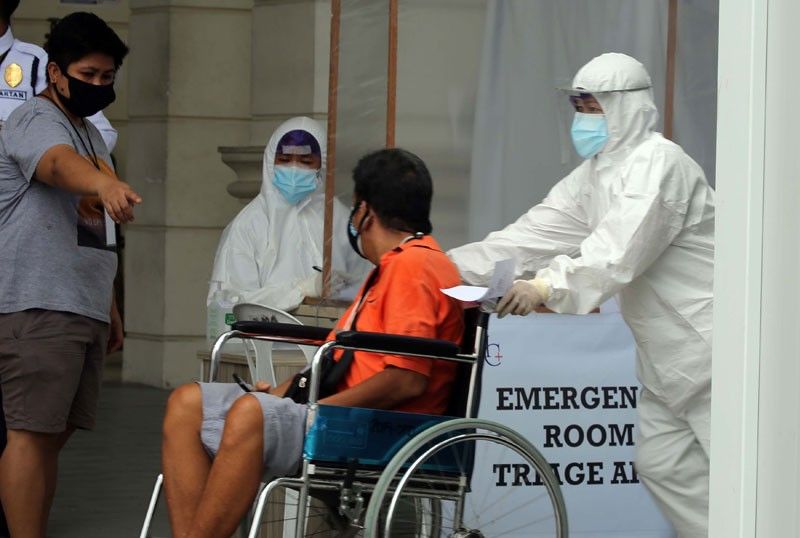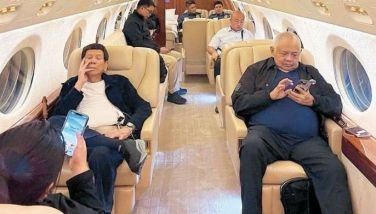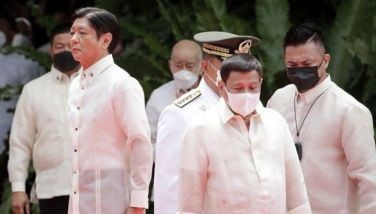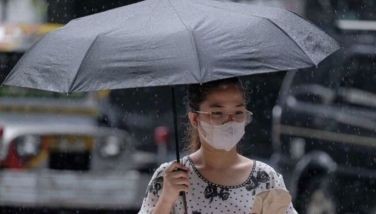Duterte to health workers: Stay in Philippines

MANILA, Philippines — While some healthcare workers with signed contracts are now allowed to leave for abroad, President Duterte has appealed to their sense of nationhood to persuade them to remain in the Philippines as the country grapples with the coronavirus disease 2019 (COVID-19) pandemic.
Duterte said that while Foreign Affairs Secretary Teodoro Locsin Jr. thinks that health workers with contracts cannot be prevented from leaving, he is taking an “opposite view” because the country is facing an emergency.
“Teddy Boy said we cannot stop Filipinos (from leaving) to honor the contracts (otherwise, it would lead to) impairment of obligation of contracts and their right to travel... I’d like to take the opposite view,” Duterte said in a televised address Monday night.
“During ordinary times, you cannot be prevented from leaving, accept (job offers), sign contracts. But you know, during an emergency, other countries like China, when China says stop, they stop. When China says open, they open,” he added.
“I’m not trying to say that it’s not a democracy. It is a communist regime and it demands total obedience. There, you can’t say, ‘Ah, it should not be done this way.’ You’ll get caught.”
The President maintained that he does not harbor any emotion about the deployment ban and that he does not mind seeing Filipino health workers leave while the number of COVID-19 cases in the country is rising.
“I do not blame anyone. I am not angry. I do not have emotions actually about this. But if you Filipino nurses want to serve other countries, other people, it’s OK with me,” he said.
“Just remember this when the time comes that we face difficulties. We do not know (what will happen). (The number of COVID-19 cases) keeps on increasing. It’s just the first wave,” he added.
Earlier, the Philippine Overseas Employment Administration (POEA) had suspended the deployment of healthcare workers abroad “until the national state of emergency is lifted and until COVID-19-related travel restrictions are lifted in the destination countries.”
The POEA said the policy aims to “support the national objective of controlling the spread of the virus through regulating the deployment of Filipino health workers through mission critical skills framework and to prioritize human resource allocation for the national healthcare system at the time of the national state of emergency.”
The ban covered medical doctors, nurses, microbiologists, molecular biologists, clinical analysts, respiratory therapists, pharmacists, laboratory technicians, X-ray/radiologic technicians, nursing assistants or nursing aids, operators of medical equipment, supervisors of health services and personal care, and repairmen of medical-hospital equipment.
Various sectors opposed the ban, saying it prevents health workers from securing opportunities in other countries, promotes involuntary servitude and curtails their right to travel.
Last Monday, the Inter-Agency Task Force (IATF) on Emerging Infectious Diseases recommended the partial lifting of the deployment ban and exempted healthcare workers with perfected and signed overseas employment contracts as of March 8. The health workers are required to sign a declaration signifying their knowledge and understanding of the risks involved in their decision to work abroad.
“Those without contracts or those without perfected contracts, they are covered by the temporary deployment ban,” Cabinet Secretary and IATF spokesman Karlo Nograles said at a press briefing yesterday.
Duterte then blamed the United States, which has more than 580,000 confirmed COVID cases, for the departure of Filipino nurses.
“America is part of the problem of the Filipinos now. Many of them have been infected. Many have died. They are calling on just about anyone... They ask nurses to go to the embassy, they will process the visa for one day and tomorrow you can leave,” the President said.
“The problem with Americans, you could have relied on your own human resource... Now you are reducing the human resources of the Philippines. Soon, we will experience a shortage,” he added.
Duterte, however, said he understands the decision of some Filipino health workers to go to the US to seek employment.
“We are nervous here because we cannot match the offer... I understand that it’s about self-preservation. So they need to work. There are jobs in America so they go there,” he added.
Still barred
Following the statements from Malacañang and the recommendation of the IATF, thousands of health professionals will still not be able to leave the country to work since the deployment ban amid the pandemic stays for those without employment contracts, according to the POEA.
“An exemption has been provided for those with contracts signed as of March 8, but the deployment ban still stays,” POEA administrator Bernard Olalia said in an interview yesterday.
“So to be affected (by the suspension) are thousands of health workers whose applications to work in Japan, Germany and Saudi Arabia are still in the pipeline,” Olalia added.
He noted that most of those who would be allowed to leave are Balik Manggagawa or those returning to their jobs abroad and have obtained overseas employment certificate from the POEA.
The Nagkaisa labor coalition supported the recommendation of the IATF to lift the deployment ban for medical workers with existing contracts.
“What matters most in the lifting is that we are saving health care workers from a limbo of uncertainty – move them away from being blacklisted and losing their livelihood due to breach of contract,” Nagkaisa said.
The organization also favored the retainment of the ban for those seeking overseas employment for the first time.
“What they don’t understand is that what we are doing is for their protection. They are frontliners and therefore at high risk of getting the infection. As we all know, COVID-19 cases in Europe are increasing,” Olalia said.
He added that except for European countries, many countries have already ordered travel restrictions and barring foreigners, including overseas Filipino workers, from entering their territories.
Almost all countries in the Middle East, like Kuwait, Saudi Arabia and Qatar, as well as Japan and China have imposed travel ban.
The government is working for the repatriation of Filipinos who have been affected by lockdown in other countries, according to the POEA administrator.
Among those to be repatriated, Olalia said, are those who have lost their employment as their companies folded up and those placed on forced leave.
“Kuwait has also declared an amnesty and allowing foreigners to leave without exit visas, so there are Filipinos there who availed of the amnesty as well as our country’s repatriation program,” he added.
Track, deploy
The government should track all unemployed healthcare workers and deploy them to the frontlines with commensurate pay and benefits to augment the number of health workers fighting COVID-19, Sen. Joel Villanueva said yesterday.
The chairman of the Senate committee on labor and employment issued the statement as the government lifted its ban on outgoing nurses and other medical personnel with employment contracts abroad.
“We’re glad about this latest development because the sweeping ban on the deployment of health workers, especially those with existing employment contracts, puts them at risk of losing their jobs abroad, as well as the great economic impact to them for their lost income while the ban is in place,” Villanueva said.
The senator acknowledged that it would be nearly impossible for the government to fully compensate all overseas-bound health workers due to lack of funds as well as comparable employment opportunities in the country.
The Philippines’ ban on the deployment of health professionals abroad is legally valid but will only be temporary while the country is under a state of public health emergency.
“It is definitely constitutional to temporarily prohibit Filipino medical workers from leaving our country and going abroad during this time of a declared public health emergency,” Cagayan de Oro Rep. Rufus Rodriguez said.
Rodriguez, chairman of the House of Representatives’ committee on constitutional reforms, said this is based on Article 3 (Bill of Rights), Section 5 of the 1987 Constitution where foreign travel may be prohibited in cases of public health, national security or public safety.
“Clearly, the constitutional right to travel is subject to some exceptions such as when the country has a clear and present danger to our public health because of COVID-19,” he said.
The senior administration lawmaker added that the POEA has the authority to prevent these nurses and other health workers from leaving based on Duterte’s Proclamation 922 (public health emergency) and Proclamation 929 (state of calamity).
This is also based on Republic Act 11469 or the Bayanihan to Heal as One Law which the President had signed. –Mayen Jaymalin, Paolo Romero, Delon Porcalla, Edu Punay, Rhodina Villanueva, Pia Lee-Brago
- Latest
- Trending




























